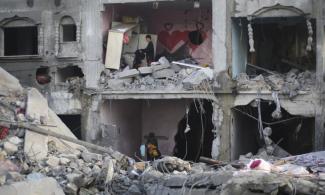
A statement by the South African Presidency on Tuesday, said, “The unprecedented military offensive against Rafah, as announced by the State of Israel, has already led to and will result in further large-scale killing, harm, and destruction.”
South Africa has appealed to the International Court of Justice (ICJ) to evaluate whether Israel’s planned ground offensive in the southern Gaza city of Rafah requires the court to intervene to prevent further breaches of Palestinian rights in an emergency filing on Monday.
A statement by the South African Presidency on Tuesday, said, “The unprecedented military offensive against Rafah, as announced by the State of Israel, has already led to and will result in further large-scale killing, harm, and destruction.”
According to RT, the African nation has suggested that the ICJ take further “provisional measures” to restrain Israel from committing further genocide.
According to the statement, the controversial military operation targeting the city, which it described as “the last refuge for surviving people in Gaza “constitutes a “serious and irreparable breach both of the Genocide Convention and of the Court’s Order of 26 January 2024”.
The ICJ’s order, issued in response to the genocide case filed by South Africa in December, saw the court command Israel to refrain from committing genocidal acts against Palestinians, specifically against killing or seriously injuring them or “deliberately inflicting… conditions of life calculated to bring about [their] physical destruction in whole or in part,” such as restricting aid deliveries.
Despite the ICJ’s preliminary ruling, Israel has continued its bombardment of the Palestinian territory, even further limiting the delivery of much-needed humanitarian aid by accusing the UN’s Palestinian refugee agency UNRWA of aiding and abetting Hamas in its raid last October.
While the UN is investigating the allegations, more than a dozen countries led by the US preemptively pulled funding from the agency. Nearly all of Gaza’s 2.1 million residents currently depend on UNRWA for aid, according to agency director Philippe Lazzarini.
Over 85% of the territory’s inhabitants have been displaced since Israel declared war four months ago, many more than once, and hundreds of thousands live in famine conditions, according to the UN.
Israel has killed more than 28,000 Palestinians, mostly women and children, in Gaza since October 7, according to the enclave’s health ministry. Israel declared war following Hamas’ cross-border strike, which left 1,200 Israelis dead and another 240 taken hostage.
Israel has driven most of Gaza’s population into Rafah with repeated evacuation orders that international human-rights experts have deemed to be attempted ethnic cleansing, designating “safe” corridors only to bomb them hours later, according to survivors.
Israel has framed its offensive on Rafah as necessary to eradicate Hamas, insisting the city is the “last bastion” of the militant group.
While Prime Minister Benjamin Netanyahu’s office allegedly ordered the military to produce an evacuation plan for civilians after the US demanded one, Palestinians have nowhere left to flee inside Gaza, as Israel has already said it will not allow them back to the destroyed northern areas.
Several Israeli politicians have openly called for their resettlement outside the territory’s borders, a policy that Israel officially disavows.
Meanwhile, the United Kingdom has called on Israel to stop and carefully consider the consequences of further military action in Rafah in southern Gaza, which hosts approximately a million displaced Palestinian civilians.
British Foreign Secretary David Cameron stated this while reacting to Israel's airstrikes on Monday that killed nearly 100 people in the city and left dozens injured, according to local officials.
Speaking to reporters on Monday, Cameron said the UK is “very concerned about the situation and we want Israel to stop and think very seriously before it takes any further action.”
He argued that “it is impossible to see how you can fight a war amongst these people,” referring to Rafah’s swollen population, noting that “there’s nowhere for them to go.”